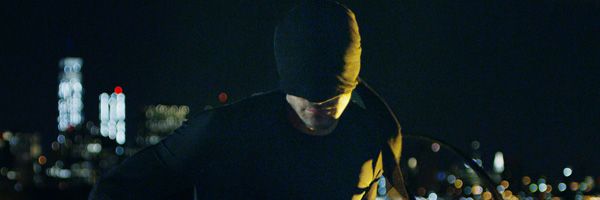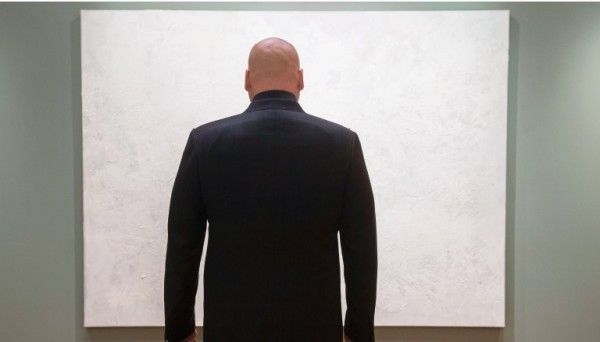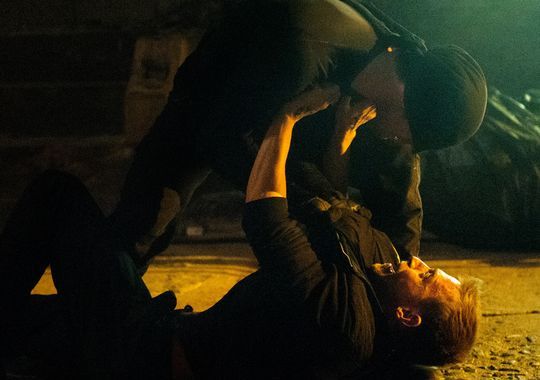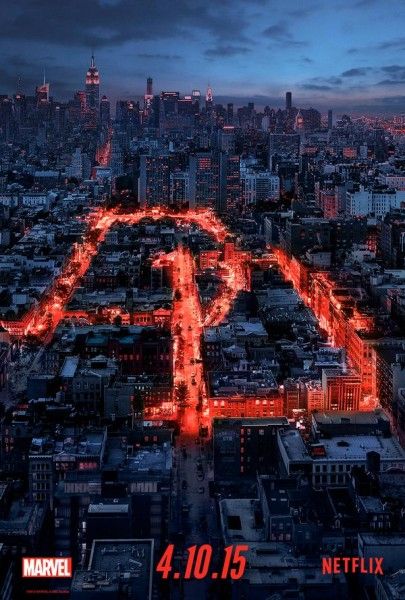This review of Daredevil is spoiler-free. Collider will be providing more in-depth and spoiled-filled coverage via episodic recaps after the series premiere.
With Daredevil, both Netflix and Marvel had the opportunity to do something different for each of their brands, and both succeeded. For Netflix, the show is its first real entry into genre storytelling, while for Marvel, Daredevil is a sleek, stylish, and distinct entry to its TV properties. Though the series kicks off in the middle of a tragic sequence regarding the origins of hero Matt Murdock's (Charlie Cox) blindness, most of Daredevil (as of the 5 episodes available for review) is unhurried, though its languid pace is punctuated by brutal bursts of violence.
For the uninitiated, Daredevil is the story of a blind lawyer, Murdock, who also fights crime in Hell's Kitchen as a masked vigilante known as (so far in the series) "the man in black." The Murdock we meet is just opening up his first practice with his close friend and law partner Foggy Nelson (Elden Henson), but the show also intersperses reflections on his past. The breadth of a series, instead of an ill-fated movie like 2003's Daredevil film, allows time to explore compelling subplots like Murdock's relationship with his boxer father, Jack (John Patrick Hayden), and its impact on him. It deepens Murdock's character from the onset, creating layers to his persona that are reinforced visually through the use of specific color palettes.
Early word on Daredevil was that it was designed to inhabit a darker, grittier side of Marvel's comic universe, and it very much does -- quite literally. The series is almost completely in shadow, with a pervading darkness. Almost every scene seems like it was shot in natural light, as if no one in Hell's Kitchen ever utilizes electricity. The experience is exactly like what Karen Page (Deborah Ann Woll), the law duo's first client, expresses: "I look around and I don't see the city anymore. All I see are its dark corners."
The most striking thing about Daredevil is this style choice. It paints every scene with a moody atmosphere that also puts us on par -- to a certain extent -- with Murdock's blindness. In the demi-light of the series, it's sometimes difficult to make out if someone is lurking, and if so, who they might be.
But Daredevil also incorporates the heightened abilities of Murdock's other senses, particularly hearing, to create a world for him (and for us) that is subverted to his advantage. Nowhere is this illustrated more beautifully than in one particular fight scene early on, where the action is obscured after Murdock bursts onto the scene. We can hear, but we can't see (at least, at first), and the effect is entirely mesmerizing.
The series takes its time in telling its story, as well as in how, and when, it chooses to introduce new characters. As the series wears on, it loses some of its early simplicity, but it also becomes clear that Daredevil is not just about one thing. Every episode illuminates a different facet of the story: one episode may focus primarily on the law, while another will mostly be about "the man in black" owning the night. Gangsters, Russian villains, and the Kingpin (Vincent D'Onofrio) all get their time (especially the emotional complications of the latter), and so does the occasional appearance of a priest (to tie in Murdock's Catholicism), as well as much lighter subplots revolving around Foggy, who infuses the show with humor (although he doesn't carry that burden alone -- Murdock, too, has some great quips and one-liners of his own).
Cox's Murdock is charming and in control, even though he's not invincible (Cox's English lilt also lingers in the back of his vowels, but you'll find no complaints here). He doesn't have superpowers, but neither do the villains. His acute hearing and other senses do help, but there's a sense of a lifetime of hard work, and sometimes a weariness in Murdock. It helps add to Daredevil's grounded overall feel, along with its shadows, minimalistic score, and the naturalistic feel of the conversations. Murdock is a quietly brilliant, confident badass just going about his business. And in between, there are extended conversations between other characters, many of them lulling along in dulcet tones (with the occasional hint of menace). But when the otherwise chaste Daredevil chooses to get bloody -- which is often -- it does so in spectacularly brutal fashion.
Daredevil is also, perhaps because of its pointed, clear storytelling, easily accessible to those who haven't read the comics. As one from that set, it was still easy to become engrossed and intrigued by Murdock's world, even without deeper context. Daredevil never makes assumptions about what its audience may know, but it's also in no hurry to reveal itself. (In fact, its very slow pace is reminiscent of other Marvel TV properties, particularly Agent Carter). That, too, is the prerogative of a show given time to tell its story exactly as it chooses, without the weight of ratings on its back.
But Daredevil does have a weightiness to it that doesn't make it a natural choice to binge-watch. In fact, I would recommend against it. There's a lot to take in when it comes to Murdock's world, and to fully appreciate its immersive darkness, one needs to occasionally return to the light.
Rating: ★★★★ Very good — Damn fine television
All 13 episodes of Daredevil will be available on Netflix starting at 12:01 a.m. PT on Friday, April 10th. Collider will also have weekly episodic recaps following the premiere.





